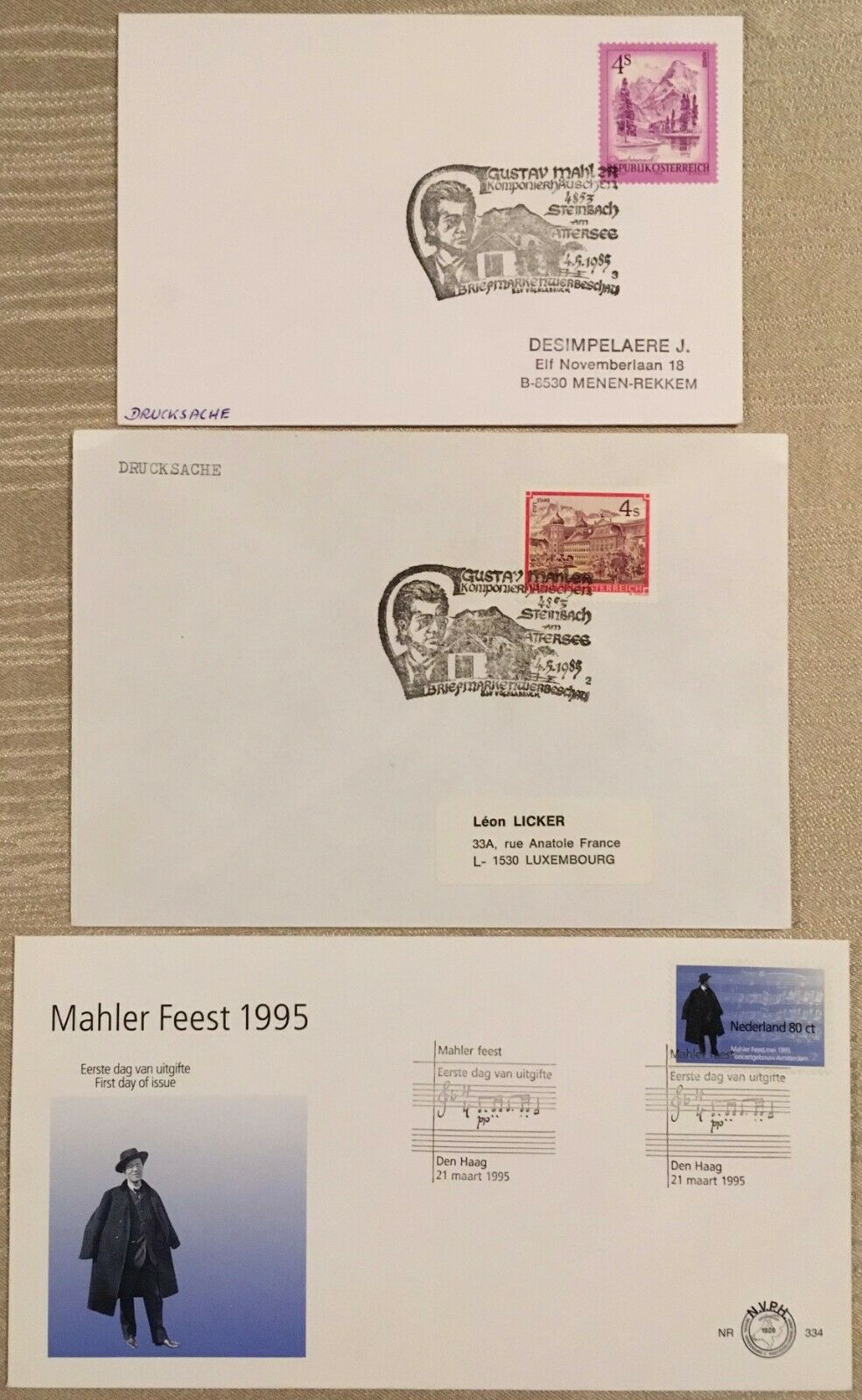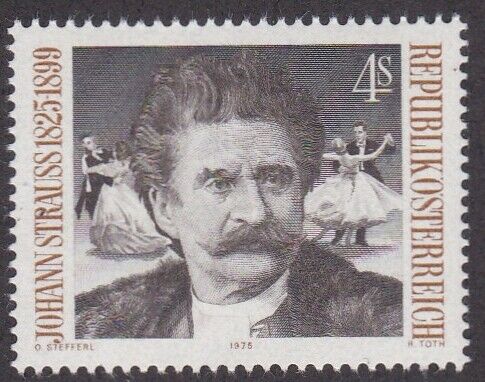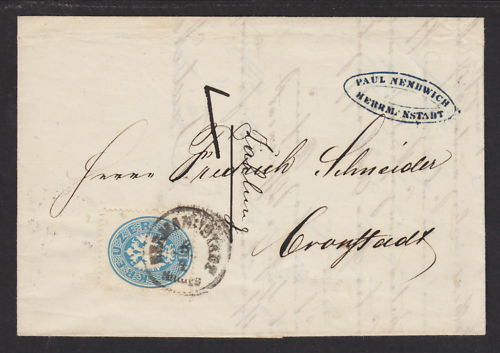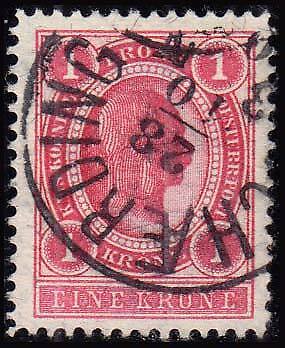-40%
3 Gustav Mahler First-Day-Covers: Composing Hut Steinbach; Mahler Fest 1995
$ 4.21
- Description
- Size Guide
Description
3 Rare Gustav Mahler First-Day-Covers (FDC) and Postage StampsKomposerhauschen (Composer Hut)
4853 Steinbach am Attersee
4.5.1985 Briefmarkenwerbeschau
Mahler-Feest 1995
The Concertgebouw Orchestra, et. al.
3.21.1995 The Hague (Amsterdam) Netherlands
Very Good to Excellent Condition. Ungraded. The Steinbach envelopes stamped with illustrated FDC cancel and Republic of Austria postage. No rips, no crease marks, previous owner addresses on the front. Light surface wear on the rear. The Mahler-Feest envelope is in excellent near mint ungraded condition. No discernible wear.
Free USA Shipping
>>>>
Issued to commemorate the restoration of Gustav Mahler's composing hut on Lake Attersee in Steinbach, Austria. Mahler composed two symphonies here and a dozen of songs.
The composing hut of Mahler (Komponierhäuschen) is a little museum and memorial in Steinbach at Lake Attersee in upper Austria dedicated to the classical composer. In this hut Mahler retreated from 1893 to 1896 in order to compose music. Since 1985 a permanent exhibition can be seen here. Other composing huts of Mahler still exist as well. One can be found at Lake Wörthersee, also in Austria, and there is one next to the Gustav Mahler Stube in South Tyrol, Italy.
In 1893, Mahler was kapellmeister in the city theatre of Hamburg. In that year he came to Steinbach for his first time, together with his sister Justine and a friend of the family, Natalie Bauer-Lechner. They booked five rooms in Gasthaus zum Höllengebirge to pass their vacation here. The natural environment inspired Mahler to compose two symphonies and a dozen songs. To be able to work in peace, he had this composing hut built in 1894 by Johann Lösch. There were three windows, and Mahler had a chair, table, stove and a piano at his possession. After he left, the hut remained constantly used for other activities. It has been used as a washing house, sanitary facility and slaughterhouse. In 1985 neglect and destruction were prevented, when it was renovated to house a permanent exhibition.
Since 1985 the composing hut shows a permanent exhibition of Mahler's piano, photographs, music sheets and original documents. In 2016 the presentation was renewed by the International Gustav Mahler Society. The society updated the presentation by introducing multimedia techniques that year. The presentation consists of six digital wall displays, with a chronology of the life of Gustav Mahler, Attersee and Mahler's years there (1893-1896), the construction of the hut, information regarding the surrounding nature and people of the area, and scores of Des Knaben Wunderhorn and Mahler's second and third symphonies.
>>>>
Gustav Mahler (7 July 1860 – 18 May 1911) was an Austro-Bohemian Romantic composer, and one of the leading conductors of his generation. As a composer he acted as a bridge between the 19th-century Austro-German tradition and the modernism of the early 20th century. While in his lifetime his status as a conductor was established beyond question, his own music gained wide popularity only after periods of relative neglect, which included a ban on its performance in much of Europe during the Nazi era. After 1945 his compositions were rediscovered by a new generation of listeners; Mahler then became one of the most frequently performed and recorded of all composers, a position he has sustained into the 21st century. In 2016, a BBC Music Magazine survey of 151 conductors ranked three of his symphonies in the top ten symphonies of all time.
Born in Bohemia (then part of the Austrian Empire) to Jewish parents of humble origins, the German-speaking Mahler displayed his musical gifts at an early age. After graduating from the Vienna Conservatory in 1878, he held a succession of conducting posts of rising importance in the opera houses of Europe, culminating in his appointment in 1897 as director of the Vienna Court Opera (Hofoper). During his ten years in Vienna, Mahler—who had converted to Catholicism to secure the post—experienced regular opposition and hostility from the anti-Semitic press. Nevertheless, his innovative productions and insistence on the highest performance standards ensured his reputation as one of the greatest of opera conductors, particularly as an interpreter of the stage works of Wagner, Mozart, and Tchaikovsky. Late in his life he was briefly director of New York's Metropolitan Opera and the New York Philharmonic.
Mahler's œuvre is relatively limited; for much of his life composing was necessarily a part-time activity while he earned his living as a conductor. Aside from early works such as a movement from a piano quartet composed when he was a student in Vienna, Mahler's works are generally designed for large orchestral forces, symphonic choruses and operatic soloists. These works were frequently controversial when first performed, and several were slow to receive critical and popular approval; exceptions included his Second Symphony, and the triumphant premiere of his Eighth Symphony in 1910. Some of Mahler's immediate musical successors included the composers of the Second Viennese School, notably Arnold Schoenberg, Alban Berg and Anton Webern. Dmitri Shostakovich and Benjamin Britten are among later 20th-century composers who admired and were influenced by Mahler. The International Gustav Mahler Institute was established in 1955 to honour the composer's life and achievements.










